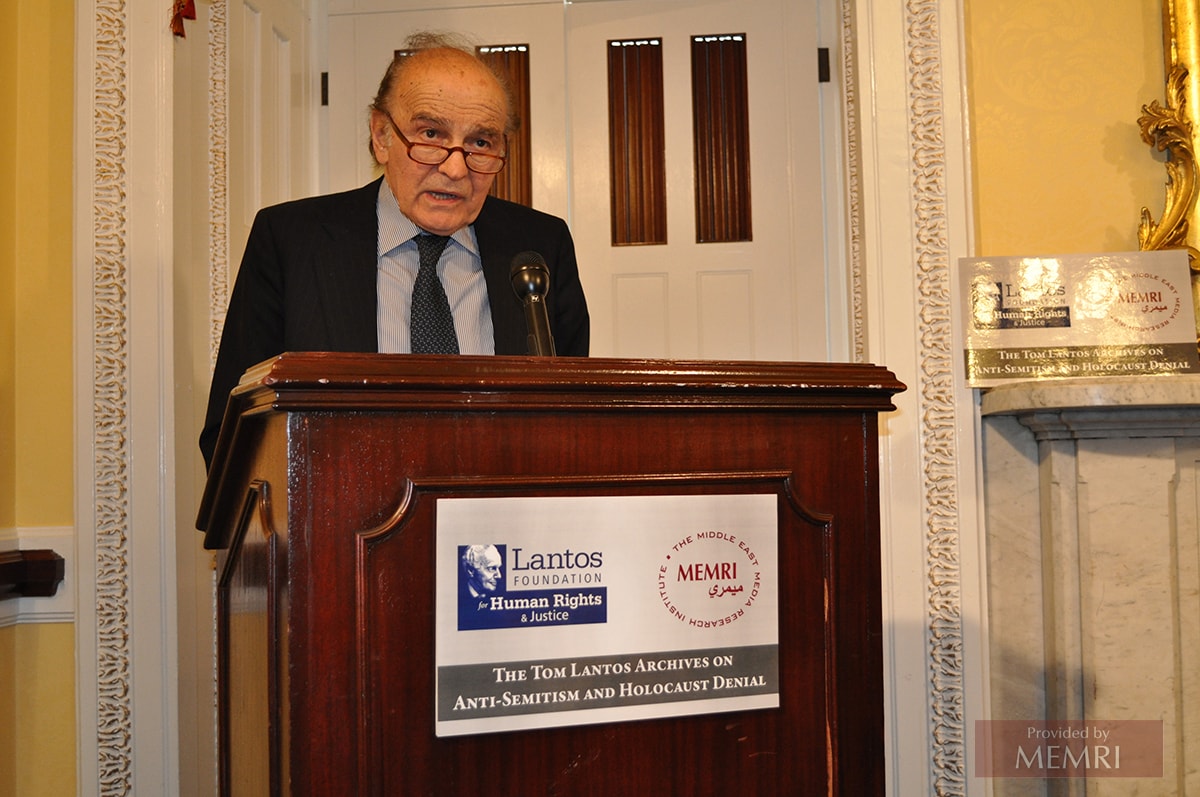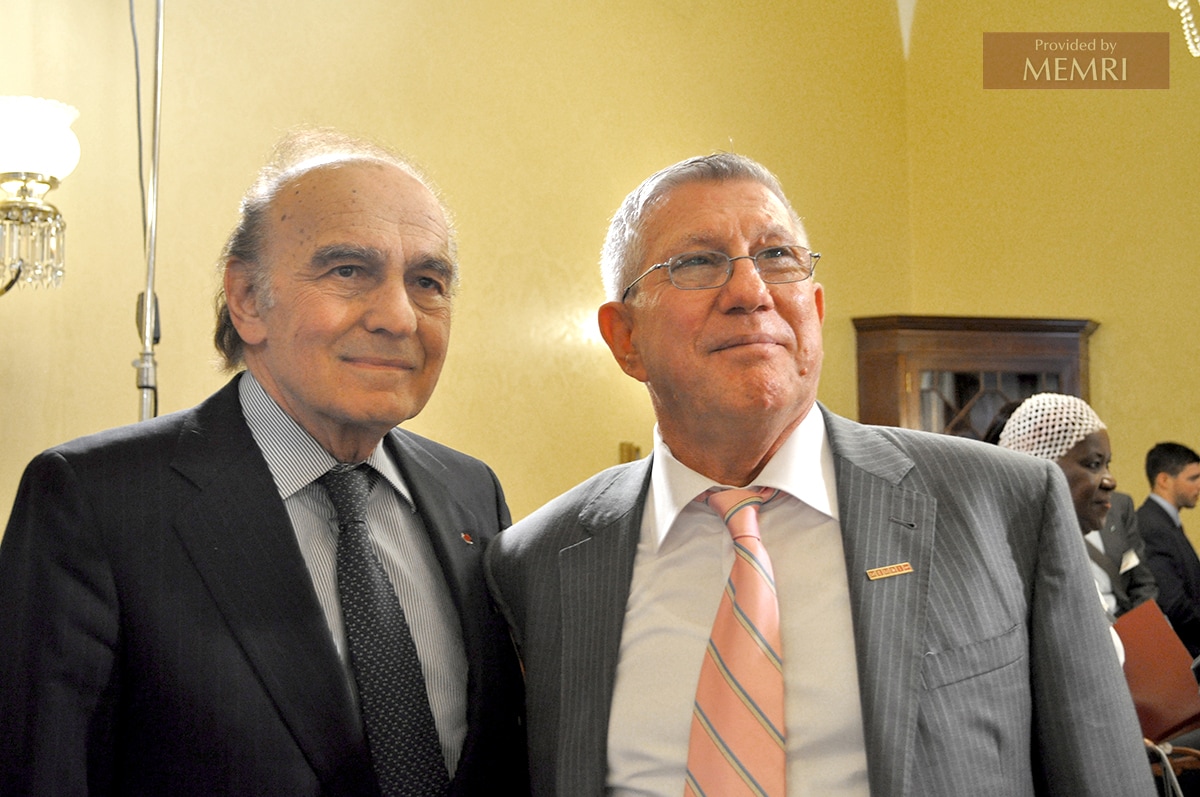To mark International Holocaust Remembrance Day 2021, we are releasing a speech by the late Amb. Samuel Pisar, who served as UNESCO Honorary Ambassador and Special Envoy for Holocaust Education, delivered at the fourth annual event of the Lantos Archives on Antisemitism and Holocaust Denial that was held in the Speaker's Dining Room at the U.S. Capitol on July 18, 2012.
At the fourth annual event of the Lantos Archives on Antisemitism and Holocaust Denial, held on July 18, 2012 in the Speaker's Dining Room of the U.S. Capitol, MEMRI was honored to have Ambassador Samuel Pisar speak. The Polish-born Amb. Pisar, who served as UNESCO Honorary Ambassador and Special Envoy for Holocaust Education, was a teenage survivor of Auschwitz and other concentration camps, and became an acclaimed international lawyer, author and human rights activist. In his memoir Of Blood and Hope, which won the 1981 Present Tense Literary Award, he tells how he survived the Holocaust. A founder of Yad Vashem France, Mr. Pisar is also distinguished as a commander of the French Legion of Honor and a commander of the Order of Merit of the Republic of Poland, and an honorary officer of the Order of Australia for service to international relations and human rights. Amb. Pisar served on MEMRI's Board of Advisors.
To view the video of Amb. Pisar's speech, click below.
The following is the transcript of Amb. Pisar's speech.
"Thank you for these almost excessive words of introduction. I am still under the shock of what we have just seen. The hysterics we have heard in the first film is exactly what I used to hear as a child in Nazi-occupied Europe. For me, it was a considerable cold shower, that gave a sense of reality of what we are up against, and what the free and democratic world is up against. And as the saying comes, with God's help, we shall overcome.
"Ladies and Gentlemen, it is, of course, an immense honor, and an immense emotion, to address this distinguished gathering at the Capitol, where I once worked for several Committees of the Congress, and permit me to say, where both houses voted for a special Act of Congress to grant me citizenship. An act in 1961 signed by President Kennedy, whom I served as a very young, and an unlikely, advisor.
"How I wish that Congressman Tom Lantos could be with us here today. I was fortunate to know this exceptional man, and his no less exceptional lady, Annette. Many memories come to mind in this place. Memories of our encounters. One such memory is when he told me, one day, that he had lost his family in Auschwitz, as I had lost mine. He asked me on one occasion, I believe it was in Paris, if I would tell him a little of what I had witnessed there, as a 15-year-old adolescent. I spared him the horrors, and we both conversed with tears in our eyes.
"That extermination of 400,000 Hungarian Jews took place in 1944 after the Normandy landings, when the gas chambers were killing innocents at the average rate of 10,000 per day. I was there, and even though I was a youngster, I knew and understood what was going on. 10,000 per day –more than all of General Eisenhauer's soldiers, who fell on what came to be known famously as the Longest Day. This, briefly, to throw some light on what motivated Tom in his noble lifelong efforts to ensure that such horrors will never happen again.

"Dear friends, antisemitism and Holocaust denial is a huge subject for a short speech. To make it meaningful, I must summon the voice of the other individual that still inhabits me today – the skeletal young boy, with shaved head and sunken eyes, who dodged death in Auschwitz, Majdanek, Dachau, and other infernos, until I escaped from my torturers and was liberated by an armored column of GIs, yelling at the top of my lungs: 'God bless America'.
"Today, within the historic walls of Congress, of the Capitol, I feel emboldened to say to you that yes, I have experienced, in body and soul, the very epicenter of the greatest catastrophe ever perpetrated by man against man, under the eyes of a largely indifferent world. That there, the human animal revealed himself to be morally flawed – maybe genetically flawed – capable of the worst as of the best, of hatred as of love, of madness as of genius. That the unthinkable, the unimaginable, is again possible, even a global apocalypse, an apocalypse engulfing all mankind, and if not with plagues of toxic gas, then God-forbid, with atomic mushroom clouds and ballistic missiles in the murderous hands of contemporary tyrants and fanatics.
"In our newly inflamed and destabilized world, the ashes of the Holocaust therefore speak to us not only about the past, but also about the present and the future. Yet today's despots and demagogues, some with nuclear ambitions, who call the Holocaust a 'myth,' are again plotting to wipe us out, and possibly other vulnerable peoples as well. Antisemitism, whether religious, racial, or ideological, has been a scourge since time immemorial. But in our era, which for me, began in September 2001, it is taking on a different character. Ambassador Eisenstadt elaborated on it. But let me say a few words about it, too.

Amb. Samuel Pisar with Katrina Lantos Swett and Annette Lantos
"In parallel with the old variety of antisemitism, practiced by the extreme political right, here and there, which has sharply receded and declined in recent decades. Parallel with that, there has emerged a new variety, that is thriving among radical extremists in the Muslim world. In many ways, this new antisemitism – which, as Eisenstadt said, is somewhat synonymous with Zionism – targets Jews in the Diaspora, no less than in Israel. Moreover, it spreads its poisonous propaganda. I will never forget this film. It spreads it not only in the Arab world, but also in European and other countries with large and growing Muslim populations.
"Faced with this, dear Yigal Carmon, one is tempted to ask if the MEMRI and Lantos Archive should not extend the scope of their precious research to these increasingly troubled places as well. The Jews of the Diaspora, we should start thinking a little more about... Also need protection, as Israel does. Something for you to ponder.

Amb. Samuel Pisar with MEMRI President Yigal Carmon
"The new hydra of antisemitic violence and terror is spreading its tentacles in many directions. France, which has the largest Jewish population in Western Europe and no institutional antisemitism whatsoever, is currently its principal victim. Nothing has demonstrated this more clearly than the tragedy that struck, in April of this year, the city of Toulouse. There, Mohammed Merah, a fanatic jihadist manipulated – by his own admission – by Al-Qaeda, shot at random three children and one adult in a Jewish school, after having murdered four French soldiers of Muslim origin. The former out of hatred for Israel, and the latter out of hatred for France, his country of birth. Why? Because it maintained a military contingent in Afghanistan. 'I love death more than you love life,' he told morbidly his interrogators while under arrest.
"That drama triggered a rash of other aggressions against Jews by fanatics of similar ilk – mostly isolated, alienated individuals or groups, emanating from overcrowded Muslim suburbs mired in joblessness, misery, and hatred, and spurred on by fiery preachers after Friday night's prayers in mosques. Similar aggressions are now rife in other West European capitals, notably Berlin, London and Amsterdam. None of them traditional antisemitism. In the eastern half of the continent, antisemitic incidents are of a more classical, racist, or neo-Nazi kind. What is reassuring, however, is the fact that civil society at large, official political authorities, and moderate religious leaders are actively cooperating with the local Jewish communities to control and eliminate these worrisome trends, even if leftist circles in the political spectrum tend to sympathize with such radicals.
"So, as I approach my conclusion, let me end as is customary, with an optimistic note. Looking back at the crises and upheavals that once destroyed my universe, I shudder to think what might happen in a weakening Europe, threatened by economic and political setbacks. A Europe if it were to fall prey to mounting unemployment, insecurity, and, most of all fear. For when rampant fear drowns reason, populist folly recruits merciless saviors. Saviors with a moustache. This, dear friends, is how democracies perish and how hunts for scapegoats begin. And we the Jews are always first in line for such hunts, before they reach others and start gangrening all democratic societies. Meanwhile, sworn enemies everywhere, almost everywhere, go on killing and maiming innocents, without distinction, including their own kin. And this in the name of our common Abrahamic God, who has enjoined us to love life, rather than death.
"For last year's commemoration of the Holocaust, I found myself in Auschwitz-Birkenau at the behest of the so-called Project Aladdin, sponsored by UNESCO and the French Foundation for the Memory of the Shoah. Some 200 Jewish, Muslim, and Christian leaders, including heads of state, chief rabbis, grand muftis, and eminent cardinals also joined that pilgrimage. My mission there was of course, to bear witness. To bear witness in the name of the martyrs and the survivors. To bear witness that far from being a myth, the Holocaust constituted a supreme warning for all humanity of horrors that may still lie ahead. Surrounded by the mind-boggling evidence in Birkenau, that was staring us in the face, united by common pain and shared moral values, that extraordinary ecumenical assembly transcended all political, racial, and religious strife to pray together for a safer and better world.

"To my surprise, every one of them seemed to reject the cynical allegations that what we had endured – we, the survivors – had never happened. They also seemed to approve when I suggested that such slanders were unworthy of people who worshipped the same monotheistic God. Following that rare moment of interfaith solidarity, I was invited to lead a group of the participants to testify before the Committee on Foreign Affairs of this House, where similar sentiments were of course expressed.
"Here, the grand mufti of Bosnia, Dr. Mustafa Ceric, repeated the moving declaration he had made in the ruins of the Birkenau crematoria, for the benefit of his own co-religionists and for the rest of us. A quote from a brief speech he delivered after mine, and after the ritual Kadish was said by the chief rabbis: 'I came here to see for myself the evil humans can do to humans, and to say that those who deny the Holocaust of Auschwitz and the genocide of Srebrenica are committing Holocausts themselves.'
"Of course, I was aware, fully aware, that one nightingale does not make a spring, particularly an Arab spring. But these unexpected encounters and exchanges have somehow fortified my hope for the eventual reversal of the unpredictable momentum that is taking us all to a fateful crossroads: either regression towards another dark and bloody age, or continuation of the human adventure, with new leaps of imagination, innovation, and creativity, that can mobilize the enthusiasm and energies of younger generations. Younger generations which reject the idea that they are hereditary adversaries forever.
"MEMRI would do well, it seems to me, to track and research with the same efficiency and the same determination not only the negative, but also the positive aspects of peaceful coexistence with Islam."




